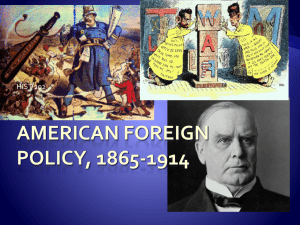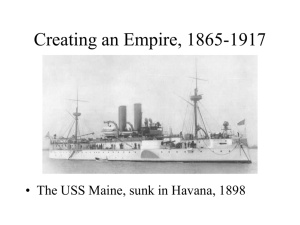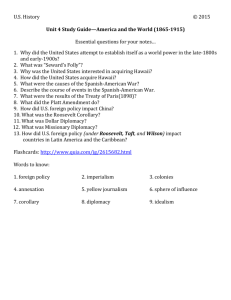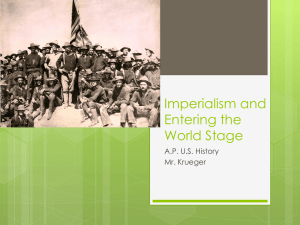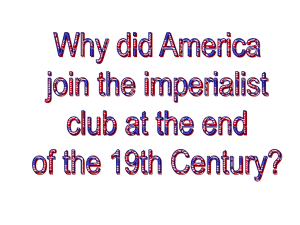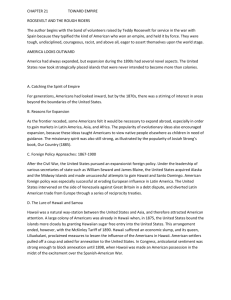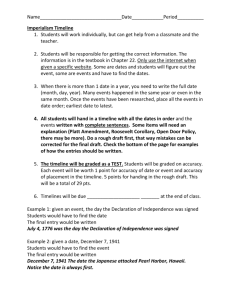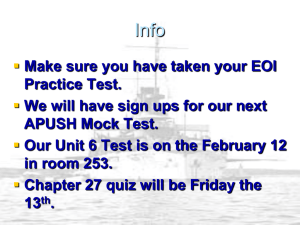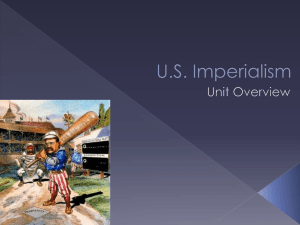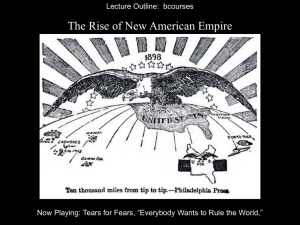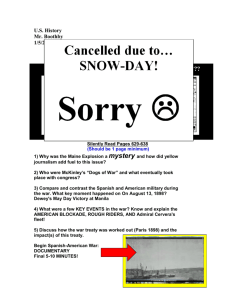United States and the World
advertisement
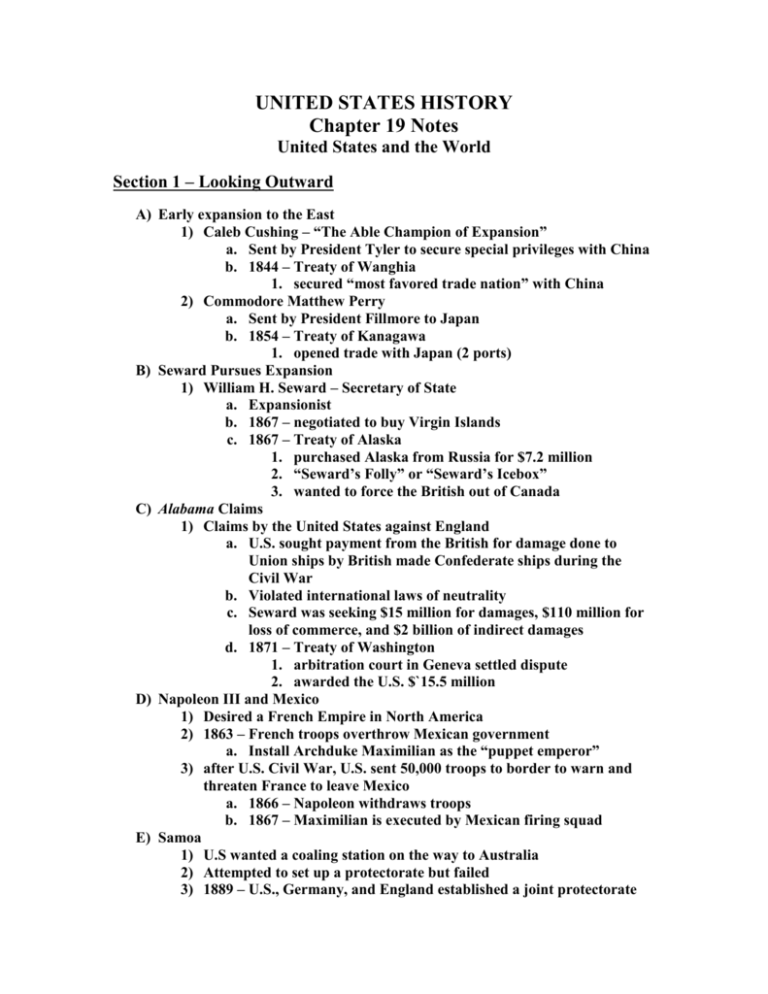
UNITED STATES HISTORY Chapter 19 Notes United States and the World Section 1 – Looking Outward A) Early expansion to the East 1) Caleb Cushing – “The Able Champion of Expansion” a. Sent by President Tyler to secure special privileges with China b. 1844 – Treaty of Wanghia 1. secured “most favored trade nation” with China 2) Commodore Matthew Perry a. Sent by President Fillmore to Japan b. 1854 – Treaty of Kanagawa 1. opened trade with Japan (2 ports) B) Seward Pursues Expansion 1) William H. Seward – Secretary of State a. Expansionist b. 1867 – negotiated to buy Virgin Islands c. 1867 – Treaty of Alaska 1. purchased Alaska from Russia for $7.2 million 2. “Seward’s Folly” or “Seward’s Icebox” 3. wanted to force the British out of Canada C) Alabama Claims 1) Claims by the United States against England a. U.S. sought payment from the British for damage done to Union ships by British made Confederate ships during the Civil War b. Violated international laws of neutrality c. Seward was seeking $15 million for damages, $110 million for loss of commerce, and $2 billion of indirect damages d. 1871 – Treaty of Washington 1. arbitration court in Geneva settled dispute 2. awarded the U.S. $`15.5 million D) Napoleon III and Mexico 1) Desired a French Empire in North America 2) 1863 – French troops overthrow Mexican government a. Install Archduke Maximilian as the “puppet emperor” 3) after U.S. Civil War, U.S. sent 50,000 troops to border to warn and threaten France to leave Mexico a. 1866 – Napoleon withdraws troops b. 1867 – Maximilian is executed by Mexican firing squad E) Samoa 1) U.S wanted a coaling station on the way to Australia 2) Attempted to set up a protectorate but failed 3) 1889 – U.S., Germany, and England established a joint protectorate a. The British eventually withdrew F) Chile 1) Secretary of State Blaine wanted to open trade w/ neighbors 2) 1889 – International American Conference a. Formed the International Bureau of American Republics 1. meant to encourage relations through out hemisphere 2. renamed Organization of American States 3) October 1891 a. American sailors on leave from the USS Baltimore are attacked on the streets of Valporaiso b. Chile refuses to apologize c. President Harrison sends message to congress asking for action d. Chile backs down and apologizes when U.S. Fleet arrives off their coast Section 2 – Expanding on the Seas A) Mahan and Sea Power a. Captain Alfred Thayer Mahan wrote “The Influence of Sea Power Upon History” b. Believed sea power made nations great c. U.S. should sell its products on all continents d. Called for a strong navy, a canal over Panama, dominance in the Caribbean, and control over Samoa and Hawaii e. Established Naval War College at Newport, Rhode Island f. Henry Cabot Lodge and Theodore Roosevelt were big supporters of Mahan B) U.S. and Hawaii a. Americans first arrived in Hawaii in the 1790’s (missionaries and whalers) b. By 1849, the U.S. was determined to hold onto Hawaii c. President Pierce attempted to annex in 1854 d. 1893 – settlers and U.S. Marines from the USS Boston overthrow Queen Liliuokalani e. 1894 – President Cleveland withdraws troops (he was against expansion) f. 1898 – Hawaii is annexed by the U.S. after the Spanish American War Section 3 – War with Spain (Spanish American War) - 1868 – Cuban rebels begin agitating for independence from Spain - 1896 – William McKinley is elected president A) The Yellow Press a. Joseph Pulitzer (New York World) and William Randolph Hearst (New York Journal) - printed sensationalized stories - both papers featured the “Yellow Kid” cartoon by Richard Outcault - papers were given the name “yellow press” B) United States Readies for War a. Americans had invested over $50 million in Cuban sugar - McKinley was intent on protecting business interests b. February 1898 - N.Y. Journal prints a stolen letter from Spanish Ambassador Dupuy de Lome - refers to McKinley as “weak” c. February 15, 1898 - USS Maine explodes in Havana Harbor - “Remember the Maine” – yellow press slogan d. February 25, 1898 - Asst. Secretary of the Navy, Teddy Roosevelt, cables Commodore George Dewey to prepare for war with Spain in Asian waters C) United States goes to war a. “Jingoes” wanted war i. Name given to Americans who were in favor of war with Spain b. April 11, 1898 – U.S. declares war on Spain c. May 1, 1898 – Dewey attacks and destroys Spanish Fleet in the Philippines – lasted 7 hours d. Roosevelt helps form the Rough Riders i. Volunteer cavalry unit made up of cowboys, sheriffs, and desperados from the west and polo players and steeplechase riders from the east ii. June 22, 1898 – Rough Riders arrive in Cuba without their horses iii. July 2, 1898 – Rough Riders and 10th Negro Cavalry storm San Juan Hill and Kettle Hill iv. July 15, 1898 – Spain surrenders e. “splendid little war” i. War lasted only 4 months ii. 379 died in combat and 5083 died from disease 1. more died in 3 days at Gettysburg (due to combat) than during the entire Spanish American War f. December 10, 1898 i. Treaty signed in Paris 1. Spain gave up control of Puerto Rico, Guam, and the Philippines 2. U.S. compensated Spain with $20 million D) Americans Opposed to Empire a. Anti-imperialist opposed the U.S. policy towards expansion abroad b. Included both Democrats and Republicans, as well as, labor leaders, industrialist, educators, philosophers, social workers, and writers c. They were especially disturbed by the treatment of the Philippines E) Election of 1900 a. McKinley was renominated and Teddy Roosevelt was his V.P. running mate b. Democrats nominated William Jennings Bryan i. Slogan on U.S. flag said “The flag of the republic forever, of an empire never!” c. McKinley and Roosevelt won F) Reorganization of Cuba a. Tellar Amendment (April 1898) i. adopted before the war ii. would not allow U.S. to take control of island iii. allowed for political independence under certain conditions b. General Leonard Wood i. military governor of Cuba ii. set up school and financial systems on island c. Major Walter Reed i. studied and found cure for yellow fever epidemic d. Platt Amendment – 1903 i. provision which had to appear in Cuban constitution before the U.S. would withdraw troops G) Puerto Rico a. Cross between colony and territory i. U.S. appointed a governor and a 11 man council (5 were Puerto Rican) ii. 35 member elected legislature iii. court system similar to the U.S. H) Open Door in China a. after being defeated by Japan in 1895, China was divided up between France, Germany, Japan, and Russia i. known as “spheres of influence” b. U.S. had acquired Hawaii and Philippines and were interested in trade with China i. Secretary of State John Hay sends letters to occupying nations ii. requested the opening of ports for trade for all iii. pushed U.S. deeper into world affairs I) Boxer Rebellion a. Chinese determined to fight foreign influence b. citizens join patriotic societies to fight i. “Righteous Fists of Harmony” (Boxers) c. rebellion began in 1900 i. killed foreign families and missionaries ii. foreign powers wanted revenge, but Hay was determined to continue with open door policy and to maintain independence of China iii. forced Chinese government to punish ringleaders of rebellion iv. Chinese impressed with U.S. diplomacy The United States had now become a world power
